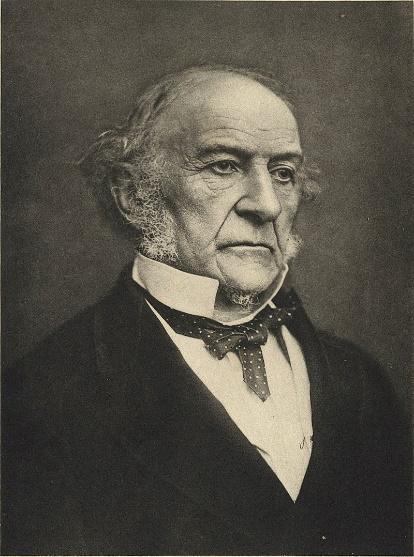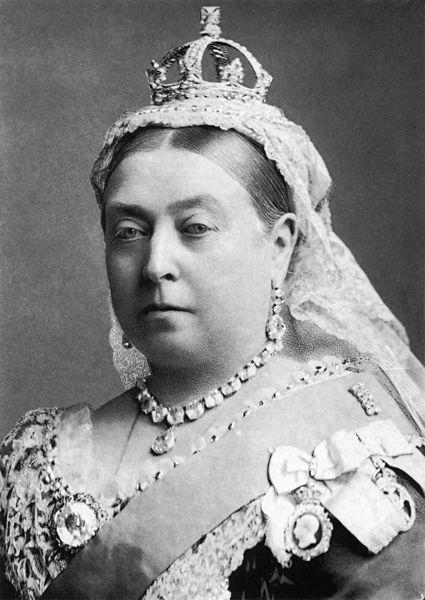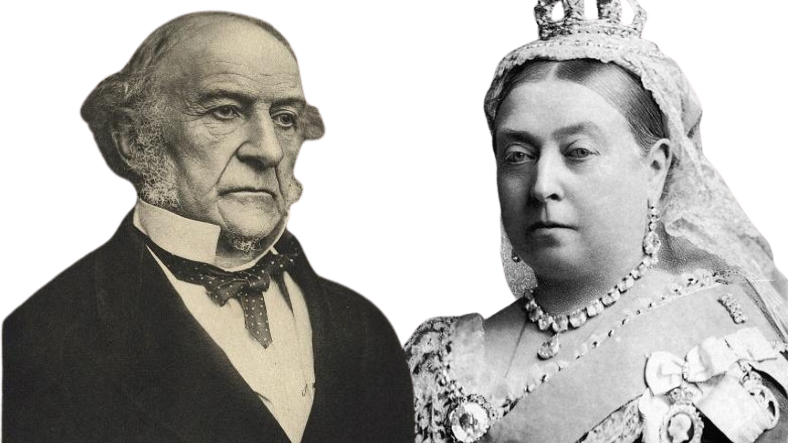
Why Couldn’t They Get Along
William Gladstone was the Prime Minister of England four times (between 1868 and 1898) during the reign of Queen Victoria (1837 – 1901).

Description: Gladstone – Tall, erect, the picture of uprightness and Victorian manliness. In his younger years, he had a great mane of hair that shook when he spoke. And speak he did – up to four or five hours at a time. He sent chills through his listeners; he inspired awe. He was mesmerizingly righteous. “An imposing, cerebral man with hawk-like eyes, he was a popular, frugal chancellor who was intent on reform. Clouds of glory seemed to trail him, his eyes flashing like an Old Testament prophet. More energetic and industrious than men half his age. Visiting the queen at her summer home, Balmoral, Gladstone, 54 years old, walked 25 miles a day. His normal practice was to write dozens of letters daily, read voluminously. He invested hours examined his soul and praying. He was a passionate man and deeply religious. A strong Christian faith (prose: Erickson).
Ten years senior to the queen, many believed him her better in every way except birth. Bluntly honest. Diligent effort. Prodigious productivity. Too principled to be evasive and too concerned to soft pedal issues, Gladstone lacked the patience to pamper the queen and play to her vanity. When Gladstone’s wife told him to “pet the queen,” he did not know how. What he lacked was the delicate tact required to manage a prickly sovereign. Nor was he able to explain policies in a simple way. He frequently baffled the queen, who hated feeling stupid or patronized. But she thrived in the presence of a man who charmed her, who confided in her and sought her approval.
Description: Victoria Reigned 64 years — starting when she was a teenager — Victoria watched a lot come and go. She survived several assassination attempts, married a German prince, and had nine children. Since royalty only married royalty, her children lived in palaces all over Europe. So when wars arose – which happened frequently – family members were pitted against each other.
She showed compassion for some individuals. In biographies of her, frequent references are made to her praying. The very description of the Victorian age – by definition – is a highly moral, fastidious church-going era. But she also was insensitive to the masses and ignored the gross brutality involved in expanding the British empire.
For example, she opposed Gladstone’s effort to grant the Irish home rule. He wanted the Irish Catholics to enjoy relief from their Church of England absentee landlords (most of whom lived in Britain). Victoria, as the head of the church, resisted such Irish home rule.
Spirituality of Both She “prayed that the war would end.” “Gladstone, eloquent in his piety . . . .” When Victoria’s prodigal son, Bertie, was seriously ill, Gladstone wrote to the queen: “[I] earnestly commend the sufferer and all the afflicted around him to Him who alone is able to heal and console” (Erickson, pages 195, 204 and Ibid respectively). Why could two people – both of whom claimed to love the Lord Jesus Christ – not get along positively? Could they not advance the kingdom of their Lord together? Why didn’t they sweep aside the lesser issues and major on pleasing the Lord Jesus Christ (see the author’s article Issues Swept Aside)? Near the end of their lives (about 1890), each regarded the other as insane.
Indifference of the Queen “Compassionate as she often was toward individuals who suffered misfortune, Victoria was capable of astonishing blindness when it came to her people. In 1873, with the economy suffering a disastrous downturn and unemployment on the rise, with some two-thirds of English men and women badly off and many tens of thousands destitute, it would never have occurred to the queen to throw the weight of her prestige and influence behind a campaign to alleviate human misery” (Erickson page 207).
One estimate at the time set the number of children sleeping on the streets of London summer and winter at 30,000. In a day when thousands of children (8 and 10 years old) labored in factories ten hours a day, the queen held to the common position that if they were helped it would only cause them to assume on society.
Workers were grossly underpaid and largely unprotected from industrial hazards; life expectancy was low. “These were not matters of concern for the queen, while getting perfumed violets and the rise of ritualism within the Church of England were” (Erickson, page 206).
“Victoria took it as an article of faith, as did a great many of her contemporaries, that poverty, disease, and suffering were unfortunate but unavoidable, and that given time, and the inevitable workings of progress, they would diminish, if not disappear entirely. Beyond this she did not examine the issue” (Baird, page 412).
Uniqueness of Gladstone Gladstone was remote and charmless. No humor, no juicy gossip. It was claimed that “ . . . he did not talk, he lectured” (Baird, page 376). The queen believed him too loud, too excitable, and too uncompromising. Victoria thought of Gladstone as overbearing. He disregarded her authority and views; made decisions without consulting her. The queen said, “He did not have the honor and power of his country at heart” (Erickson, page 223). According to the queen, Gladstone stormed and raved like a madman. She viewed him as overbearing and resented his disregarding her authority and views.
“It was impossible to treat the Queen as a great stateswoman because she was such a child, but it was equally impossible to treat her like a child because she showed herself to be a politically savvy on some occasions.” So said Earl Granville, Gladstone’s Foreign Secretary in 1882.
Gladstone was equally vexed with his sovereign. He found her infuriatingly manipulative. He heard via palace gossip that she hated him. Most of all, he was frustrated by her personality, that unique mix of little-girl stubbornness, toughness and petulance combined with shrewd common sense born of long experience in governing.
Expansion of the Empire During Queen Victoria’s reign, the British empire expanded significantly. And with attitude – “ ‘I contend,’ declared Cecil Rhodes [for whom Rhodesia was named until it was re-named Zimbabwe], avid to expand British rule over all southern Africa, ‘that we are the first race in the world, and that the more of the world we inhabit, the better it is for the human race’” (Erickson, page 209). Most of Victoria’s subjects agreed with this breathtaking pronouncement, convinced that the benefits of Christianity, improved hygiene and British-made goods were self-evident to all right-minded people.
- When the title Empress of India was conferred on Victoria the public lauded it as only natural. Expected.
- “It was a short step from being glad over Sir Garnet Wolseley’s victory over the Ashanti tribe in Africa to many such victories all over the world. And so the British swaggered forth in confidence – ignoring humanitarian concerns – in their pursuit of preeminence .” Erickson 210.
- In 1875, when Prime Minister Disraeli managed to purchase from the debt-ridden Khedive of Egypt slightly less than half the outstanding shares in the Suez Canal, the public cheered and the queen lauded the Prime Minister’s financial coup.
Victoria wore the spoils of conquest around her neck – diamonds and gold – while unaware of the slaughter of her own soldiers and natives required to have such wealth. Responding to the excesses and expensiveness of the British monarchy, eighty-five Republican Clubs were founded in Britain, protesting the decadence and uselessness of the monarchy. But Victoria simply out-lived her critics.
Let’s return to our own day as we re-visit “Why couldn’t they get along? Why didn’t they focus on advancing the name of the One they claimed to love and serve? More personally, why can’t we? Very possibly you have a Gladstone or a Victoria in your life. Does God want you to focus on the things about which you agree? Does God want us to advance commonly held truth so Jesus will be more famous?
Keith Kaynor, Action MemberCare
Sources:
Her Little Majesty; The Life of Queen Victoria, by Carolly Erickson; Simon & Schuster 1997. Her title seems to imply disrespect for the queen, whom she seems to regard as childish. 264 pages
Victoria the Queen; by Julia Baird; Random House, 2016; 493 pages. Her book gives the reader too much information about the queens sex life and not enough about her spiritual life (how Scripture influenced her, which was my chief interest).


Recent Comments